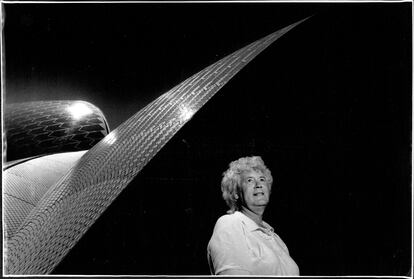Jan Morris: The writer who discovered she ‘was born in the wrong body’
The author’s 1974 autobiography is a moving tale of love and self-discovery, all the more relevant today amid the alarmist debates on trans rights

“I was three or perhaps four years old when I realized that I had been born into the wrong body, and should really be a girl.” That’s how Jan Morris, one of the great writers of the 20th century, begins her autobiography Conundrum. Morris, who is best-known for her travel literature on Venice and Trieste, published the autobiography in 1974, well before trans rights were part of mainstream discussion.
Conundrum is not a theoretical essay. It doesn’t try to convince anyone, nor does it attempt to spark debate. Morris – who died in 2020 at the age of 94 – simply recounts her life. The book is as exciting and evocative as her travel stories. It’s a story of love and life, pain and confusion, joy and sex. Visiting Trieste or Venice with Morris’s books in hand enriches the experience: it gives the trip an unexpected depth. She may have taken some artistic license with her tales, but few writers are able to capture the spirit and history of a place with such intelligence.
The same is true of Conundrum. Reading it now, as the fight for trans rights divides feminist groups and fuels political debate that is an often bitter and alarmist, is incredibly useful. In her book on Venice, Morris described Venetians’ complicated relationship with the truth through the words of a friend: “I never, never tell a lie, but the truth not to everyone.”
Her autobiography, on the other hand, could not be more sincere and personal. The title points to an unsolvable question. “Nobody really knows why some children, boys and girls, discover in themselves the inexpungeable belief that, despite all the physical evidence, they are really of the opposite sex,” writes the author, who was born James Humphry Morris and underwent sex reassignment surgery in 1972 in Morocco.

“Freudians and anti-Freudians, sociologists and environmentalists, family and friends, intimates and acquaintances, publishers and agents, men of God and men of science, cynics and compassionates, lewds and prudes – all have asked me these questions since then, and very often provided answers too, but for me it remains a riddle. So be it,” she writes.
Conundrum is a heartfelt book and an extraordinary love story. It speaks of Morris’s love for her partner, Elizabeth, and their five children. And it is also, importantly, a tale of self-discovery.
In a moving interview in EL PAÍS, Jacinto Antón asked Morris about the things that shaped her existence. She replied: “I believe in the paramount importance of goodness. To me, this is not an abstraction, but a real positive energy. Kindness and love. With them, you can face everything. And if you love strongly, you make everything yours, things, cities, land.” To face such a complex debate, one that touches on the enigmas of humankind, perhaps not only Morris’s literature, but her attitude towards life, is needed.
Sign up for our weekly newsletter to get more English-language news coverage from EL PAÍS USA Edition
Tu suscripción se está usando en otro dispositivo
¿Quieres añadir otro usuario a tu suscripción?
Si continúas leyendo en este dispositivo, no se podrá leer en el otro.
FlechaTu suscripción se está usando en otro dispositivo y solo puedes acceder a EL PAÍS desde un dispositivo a la vez.
Si quieres compartir tu cuenta, cambia tu suscripción a la modalidad Premium, así podrás añadir otro usuario. Cada uno accederá con su propia cuenta de email, lo que os permitirá personalizar vuestra experiencia en EL PAÍS.
¿Tienes una suscripción de empresa? Accede aquí para contratar más cuentas.
En el caso de no saber quién está usando tu cuenta, te recomendamos cambiar tu contraseña aquí.
Si decides continuar compartiendo tu cuenta, este mensaje se mostrará en tu dispositivo y en el de la otra persona que está usando tu cuenta de forma indefinida, afectando a tu experiencia de lectura. Puedes consultar aquí los términos y condiciones de la suscripción digital.









































